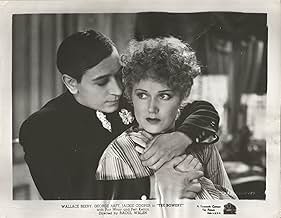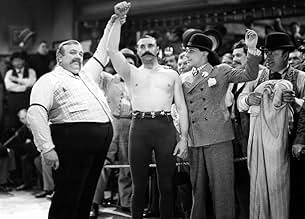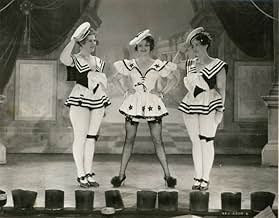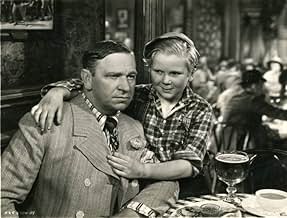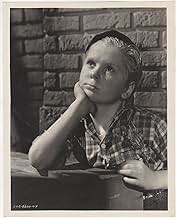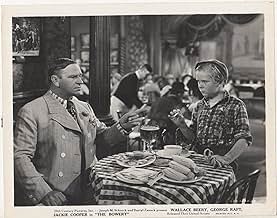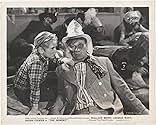Füge eine Handlung in deiner Sprache hinzuIn New York's Bowery during the Gay Nineties, a saloon owner and a rebel share a rivalry.In New York's Bowery during the Gay Nineties, a saloon owner and a rebel share a rivalry.In New York's Bowery during the Gay Nineties, a saloon owner and a rebel share a rivalry.
- Auszeichnungen
- 3 wins total
Bull Anderson
- Pug
- (Nicht genannt)
Irving Bacon
- Hick
- (Nicht genannt)
Lucille Ball
- Blonde
- (Nicht genannt)
John Bleifer
- Mumbo the Mute
- (Nicht genannt)
Phil Bloom
- Pug
- (Nicht genannt)
James Burke
- Recruiting Sergeant
- (Nicht genannt)
Marguerite Caverley
- Undetermined Secondary Role
- (Nicht genannt)
Empfohlene Bewertungen
Four words account for why this film was made - "She Done Him Wrong". The huge commercial success of that Mae West vehicle convinced the studio brass that Gay '90s melodramas were a viable proposition. Here we are rewarded with a fast moving, well written romp which neatly targets the personalities of its stars.
Wallace Beery and George Raft are excellent as friendly rivals; Jackie Cooper is a little harder to take, but it is Fay Wray who steals the film with her stock-in-trade damsel in distress. With a strong director - as Walsh proves himself to be - Wray could carry a lot of punch, and she is utterly believable as the object of both Raft and Beery's affection.
Lots of atmosphere, beautifully designed, this is a forgotten film worthy of revival.
Wallace Beery and George Raft are excellent as friendly rivals; Jackie Cooper is a little harder to take, but it is Fay Wray who steals the film with her stock-in-trade damsel in distress. With a strong director - as Walsh proves himself to be - Wray could carry a lot of punch, and she is utterly believable as the object of both Raft and Beery's affection.
Lots of atmosphere, beautifully designed, this is a forgotten film worthy of revival.
Such are the title-song lyrics to this 1933 frolic, directed by Raoul Walsh to be modest in story but long on atmosphere. Made at 20th, it has something of an MGM cast: Wallace Beery and Jackie Cooper had been such a hit in "The Champ" two years earlier, the studio must have been anxious to reteam them. Cooper was a good little actor, but here, as.an unsympathetic little ruffian in the Lower East Side of the Gay '90s, he's just marking time, and Beery, whom practically everybody who ever worked with him appears to have loathed, tries and fails to be a charmer. The story's that of Steve Brodie and his alleged jump off the Brooklyn Bridge (it was also the basis for "Kelly," a one-night 1965 musical that was, up till then, the biggest money-loser in Broadway history); it's not much of a story, but it does allow for some lively set pieces, and George Raft, as Brodie, has a part that suits him well. There's also Fay Wray, who's warm and appealing, and Pert Kelton, expertly knocking out one of the sassy broads she did so well back then. Marred by phony-looking process shots and plot implausibilities and non-clear things (I'm still not sure, did they throw a dummy off the bridge or not?), and off-the-charts non-PC by today's standards, it's nevertheless rollicking, and you can be sure that under Walsh's watch you'll get hard-hitting fights, atmosphere galore, rude insult humor, and a setting where, like the song goes, they do strange things.
I love this freekin movie! Walsh is a true master of the cinematic form, his film have been sometimes in my opinion, overlooked. But this film is a favourite of mine because it really gives you the feel of the time the film was set in.\
All the wonderful characters that existed, the lifestyle, the mode of dress, the way they spoke, OK they might be exaggerated, but it is good to know that there were occasion when two men tried to outdo each other with insane stunts.
I just felt it was apiece of history thats should be wathced by many people and appreciated because of that fact.
Can I get it somewhere on DVD? I have only seen it on TV. But for anyone wanting a slice of life movie about that period of time this is the perfect one.
All the wonderful characters that existed, the lifestyle, the mode of dress, the way they spoke, OK they might be exaggerated, but it is good to know that there were occasion when two men tried to outdo each other with insane stunts.
I just felt it was apiece of history thats should be wathced by many people and appreciated because of that fact.
Can I get it somewhere on DVD? I have only seen it on TV. But for anyone wanting a slice of life movie about that period of time this is the perfect one.
George Raft as Steve Brodie, the carefree, dancing gambler who can never refuse a dare, is pitted against the lumbering, sentimental, Chuck Connors (Wallace Beery).A soft touch for every panhandler, Connors impulsively adopts waifs and strays, notably runaway orphan "Swipes" (Jackie Cooper, complete with kittens!) and the homeless Lucy Calhoun, an out-of-town innocent with ambitions to become a writer.
In this male-dominated culture, communication takes place mostly in the form of violence (one sees why THE BOWERY is a Martin Scorsese favorite). Exploding cigars provide a running gag. "Swipes" enjoys throwing rocks through windows in Chinatown, on one occasion setting a laundry alight. (The simultaneous arrival of both Brodie's and Beery's volunteer fire companies leads to a brawl, during which the building burns to the ground.) Beery casually saps a troublesome girl, and thumps anyone who disagrees with him, including Brodie, whom he defeats, in a night-time fist fight on a moored barge, to regain control of his saloon, lost on a bet that Brodie wouldn't have the courage to jump off the Brooklyn Bridge. (Brodie does make the leap, but only because a subterfuge with a dummy fails at the last moment.)
As usual, Walsh fills the frame with detail, illustrating with relish the daily life of the tenderloin; singing waiters, bullying barmen, whores from Suicide Hall being hustled into the Black Maria, tailors collaring hapless hicks off the street and forcing them to buy suits they don't want. A minor but admirable little film.
In this male-dominated culture, communication takes place mostly in the form of violence (one sees why THE BOWERY is a Martin Scorsese favorite). Exploding cigars provide a running gag. "Swipes" enjoys throwing rocks through windows in Chinatown, on one occasion setting a laundry alight. (The simultaneous arrival of both Brodie's and Beery's volunteer fire companies leads to a brawl, during which the building burns to the ground.) Beery casually saps a troublesome girl, and thumps anyone who disagrees with him, including Brodie, whom he defeats, in a night-time fist fight on a moored barge, to regain control of his saloon, lost on a bet that Brodie wouldn't have the courage to jump off the Brooklyn Bridge. (Brodie does make the leap, but only because a subterfuge with a dummy fails at the last moment.)
As usual, Walsh fills the frame with detail, illustrating with relish the daily life of the tenderloin; singing waiters, bullying barmen, whores from Suicide Hall being hustled into the Black Maria, tailors collaring hapless hicks off the street and forcing them to buy suits they don't want. A minor but admirable little film.
In his new 20th Century Pictures Corporation which was at the time releasing its product with United Artists, Darryl F. Zanuck almost had an MGM trifecta for his stars. Wallace Beery and Jackie Cooper came from MGM and Clark Gable almost did. But according to the biography of George Raft from James Parrish, Raft wanted very much to do this film and Zanuck accommodated him and got him from Paramount.
It was a wise move on Zanuck's part because Steve Brodie of the Bowery was a part Raft was born to play. And why not since Raft grew up in the Hell's Kitchen area of New York and knew the scene well.
As did Raoul Walsh who was born and raised in Rockaway Beach, New York and also knew the red light areas of the city well. The best thing that The Bowery has going for it was is the incredible detail in terms of creating the atmosphere of the Gay Nineties in one of New York's most colorful areas. In fact so much detail was presented that the film is rarely seen today for all the racial epithets it has. But that would be true of the era. Racial and ethnic stereotyping was the rule of the day. In fact Ragtime is also quite graphic in that, the difference being the point of view that film takes.
What The Bowery has in atmosphere with its sets, dialog with the idioms of the day, and costumes, it loses in accuracy. Set in 1897-98 before the Spanish American War it has the legendary Steve Brodie doing his jump off the Brooklyn Bridge at that time. In point of fact it was in 1886.
Raft as Brodie and Beery as Chuck Connors are a pair of friendly if caustic rivals of The Bowery area in lower Manhattan. The two are forever trying to top each other and that is given as the reason for Raft doing his famous dive off the Brooklyn Bridge and living to tell about it. Actually there is cause in real life to think Brodie never did the deed. And in fact some question is raised in Beery's mind which leads to the climax of The Bowery.
Jackie Cooper's well known antipathy to Beery has been documented, but in the Parrish book on Raft during a fight scene Beery got a little rougher than the script called for. Raft then responded with what is described as a roundhouse right into the family jewels. Beery reacted normally as one does when one is hit there.
If one values political correctness than do not see this film. But otherwise it is an all too accurate a look on a bygone era.
It was a wise move on Zanuck's part because Steve Brodie of the Bowery was a part Raft was born to play. And why not since Raft grew up in the Hell's Kitchen area of New York and knew the scene well.
As did Raoul Walsh who was born and raised in Rockaway Beach, New York and also knew the red light areas of the city well. The best thing that The Bowery has going for it was is the incredible detail in terms of creating the atmosphere of the Gay Nineties in one of New York's most colorful areas. In fact so much detail was presented that the film is rarely seen today for all the racial epithets it has. But that would be true of the era. Racial and ethnic stereotyping was the rule of the day. In fact Ragtime is also quite graphic in that, the difference being the point of view that film takes.
What The Bowery has in atmosphere with its sets, dialog with the idioms of the day, and costumes, it loses in accuracy. Set in 1897-98 before the Spanish American War it has the legendary Steve Brodie doing his jump off the Brooklyn Bridge at that time. In point of fact it was in 1886.
Raft as Brodie and Beery as Chuck Connors are a pair of friendly if caustic rivals of The Bowery area in lower Manhattan. The two are forever trying to top each other and that is given as the reason for Raft doing his famous dive off the Brooklyn Bridge and living to tell about it. Actually there is cause in real life to think Brodie never did the deed. And in fact some question is raised in Beery's mind which leads to the climax of The Bowery.
Jackie Cooper's well known antipathy to Beery has been documented, but in the Parrish book on Raft during a fight scene Beery got a little rougher than the script called for. Raft then responded with what is described as a roundhouse right into the family jewels. Beery reacted normally as one does when one is hit there.
If one values political correctness than do not see this film. But otherwise it is an all too accurate a look on a bygone era.
Wusstest du schon
- WissenswertesGeorge Raft and Wallace Beery were at odds during filming. According to Raft, before the fistfight scene, Beery asked Raft to let him throw the first punch and then proceeded to sucker-punch Raft, knocking him out for several minutes. "When I came to I got up and called him everything I could think of," Raft said. They then fought for real, and the crew had to break it up.
- PatzerThe name of George Raft's character, "Steve Brodie," is misspelled "Brody" in the opening credits.
- Zitate
Steve Brodie: Don't ever say I never give ya nothin'.
- Alternative VersionenThe version shown on Fox Movie Channel runs seven seconds over 87 minutes. Apparently it is a reissue copy, the missing five minutes due to reediting to fit post code rules. Though it was made for Twentieth Century Films, a new start up film studio organized by Joe Schenck, Bill Goetz (L.B. Mayer's son-in-law) and ex-Warner Bros. production chief Darryl Zanuck, the FMC version is presented under the post merger logo of Twentieth Century Fox complete with fanfare and an end title crediting distribution to TCF. This year a full uncut version was shown at New York's Film Forum which clocked several minutes over ninety minutes.
- VerbindungenEdited into Brooklyn Bridge (1981)
- SoundtracksThe Bowery
(uncredited)
Music by Percy Gaunt
Lyrics by Charles Hale Hoyt
Sung by a chorus at the beginning
Played often in the score
Top-Auswahl
Melde dich zum Bewerten an und greife auf die Watchlist für personalisierte Empfehlungen zu.
- How long is The Bowery?Powered by Alexa
Details
Box Office
- Budget
- 421.496 $ (geschätzt)
- Laufzeit1 Stunde 32 Minuten
- Farbe
- Seitenverhältnis
- 1.37 : 1
Zu dieser Seite beitragen
Bearbeitung vorschlagen oder fehlenden Inhalt hinzufügen

